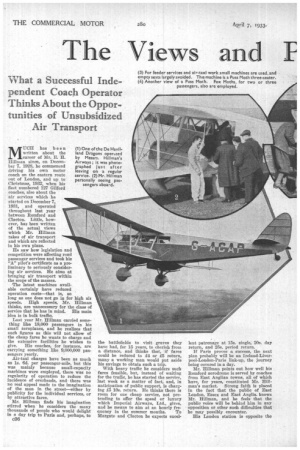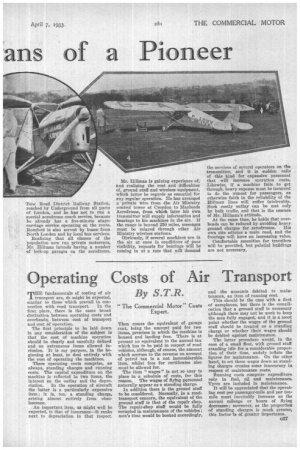The Views nd F ans of a Pioneer
Page 58

Page 59

If you've noticed an error in this article please click here to report it so we can fix it.
What a Successful Independent Coach Operator Thinks About the Opportunities of Unsubsidized Air Transport
MUCH has been written about the career of Mr. E. H. Hillman since, on December 7, 1928, be commenced driving his own motor coach on the eastern route out of London, and up to Christmas, 1932, when his fleet numbered 127 Gilford coaches, also about the air services which he started on December 7, 1931, and operated throughout last year between Romford and Clacton. Little, however, has been written of the actual views which Mr. Hillman takes of air transport and which are reflected in his own plans.
He saw how legislation and competition were affecting road passenger services and took his "A" pilot's certificate as a preliminary to seriously considering air services. He aims at bringing air transport within the scope of the masses.
The latest machines available certainly have reduced operation costs—that is, so long as one does not go in for high air speeds. High speeds, Mr. Hillman thinks, are unnecessary for the class of service that he has in mind. His main idea is in bulk traffic.
Last year Mr. Hillman carried something like 18,000 passengers in his small aeroplanes, and he realizes that such figures as this will not allow of the cheap fares he wants to charge and the extensive facilities he wishes to give. His coaches for instance, are carrying something like 9,000,000 passengers yearly.
Air-taxi charges have been as much as is. 6d. per passenger-mile, but this was mainly because small-capacity machines were employed, there was no regularity of operation to reduce the incidence of overheads, and there was no real appeal made to the imagination of the man in the street—either by publicity for the individual services, or by attractive fares.
Mr. Hillman Ends his imagination stirred when he considers the many thousands of people who would delight in a day trip to Paris and, perhaps, to c36
the battlefields to visit graves they have had, for 15 years, to cherish from a distance, and thinks that, if fares could be reduced to 14 or 1.5 return, many a working man would put aside his savings to obtain such a trip.
With heavy traffic he considers such fares feasible, but, instead of waiting for the traffic, he has started the service, last week as a matter of fact, and, in anticipation of public support, is charging 15 10s. return. He thinks there is room for one cheap service, not pretending to offer the speed or luxury which Imperial Airways, Ltd., gives, and he means to aim at an hourly fre quency in the summer months. To Margate and Clacton he expects excel lent patronage at 15s. single, 20s. day return, and 25s. period return.
If Paris proves a success, the next plan probably will be an Ireland-Liverpool-London-Paris link-up, the journey being covered in a day. Mr. Hillman points out how well his Romford aerodrome is served by coaches from East Anglian towns, all of which have, for years, constituted Mr. Hillman's market. Strong faith is placed in the fact that the public of East London, Essex and East Anglia. knows Mr. Hillman, and he feels that the public voice -will be behind him in any opposition or other such difficulties that he may possibly encounter.
His London station is opposite the Bow Road District Railway Station, reached by Underground from all parts of London, and he has not to run a special aerodrome coach service, because he already has a five-minute stagecarriage service operating on the route. Romford is also served by buses from North London and by local bus services.
Realizing that all classes of the population now run private motorcars, Mr. Hillman intends having a number of lock-up garages on the aerodrome. Mr. Hillman is gaining experience of, and realizing the cost and difficulties of, ground staff and wireless equipment, which latter he regards as essential for any regular operation. He has arranged a private wire from the Air Ministry control tower at Croydon to Maylands Aerodrome, from which later his own transmitter will supply information and bearings to his machines in the air. If the range is beyond 250 miles, messages must be relayed through other Air Ministry wireless stations.
Obviously, if several machines are in the air at once in conditions of poor visibility, requests for bearings will be coming in at a rate that will demand the services of several operators on the transmitter, and it is sudden calls of this kind for expensive personnel that will increase operation costs. Likewise, if a machine fails to get through, heavy expense must be incurred to do the utmost for passengers, as otherwise faith in the reliability of the Hillman lines will suffer intolerably. Such costly outlay can be met only by bulk traffic, and that is the essence of Mr. Hillman's attitude.
At the same time, he holds that overheads can be reduced by avoiding heavy ground charges for aerodromes. His own site adjoins a main road, and the frontage will have an increasing value.
Comfortable amenities for travellers will be provided, but palatial buildings are not necessary,












































































































